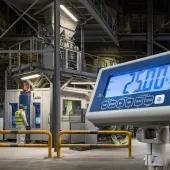Avery Weigh-Tronix issue a warning as calibration services market is set to grow
With the market for calibration services predicted to increase according to a report by Frost & Sullivan, Avery Weigh-Tronix have highlighted the importance of using a qualified engineer for calibrating weighing equipment.
The Frost & Sullivan report predicts that the calibration services market in Europe will grow from $1.09 billion to $1.55 billion by 2018.
According to Avery Weigh-Tronix this confirms that businesses are currently more likely to spend operating expense (OPEX) on maintenance of existing equipment than capital expenditure (CAPEX) for product purchase. This raises concerns about the prospect of unqualified engineers exploiting the current growth in this market leaving scales incorrectly calibrated and illegal for trading.
Maureen Bott, service product manager for Avery Weigh-Tronix advises businesses to be careful when they are considering maintenance and calibration service providers. ‘Maintaining the accuracy of weight, test and measurement data is incredibly important. It ensures legality of applications where legal for trade data is required, and accurate weight data will allow businesses to maximize their revenue.
‘If a scale is inaccurately calibrated then trading standards can take action, including penalties for using instruments outside of the legal requirements, fines, confiscation of the equipment until the fault is rectified and, in extreme cases, imprisonment. One or all of these could bring an entire businesses production or process to a halt.
‘The analysis from Frost & Sullivan confirms that spending OPEX is financially a more viable solution for many businesses than spending CAPEX. While this has caused a downturn in the uptake of companies purchasing new equipment, it is driving rapid growth in the calibration and preventative maintenance provision.
‘The predicted growth in OPEX is in one way positive because businesses are recognizing the importance of regular maintenance. While this can be more cost effective than buying new equipment in the short term, it is vital that companies don’t cut corners on their maintenance and calibration contacts. It is quite simply a false economy.
‘The most important thing for businesses to remember is that for applications where legal for trade data is required, an approved verifier is needed to conduct the calibration and re-verification. Businesses should always insist on proof of competency from their provider.
‘Properly calibrated scales ensure that you have accurate data that you can trust. More importantly it means that you stay on the right side of the law.’









